



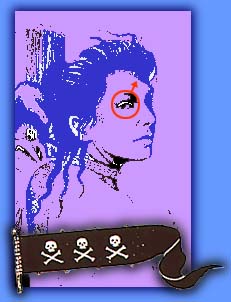



WOMEN OF THE SEA

Grace O'Malley (1530-1596)
Grace O'Malley
was an Irish pirate
who was successfully active
from 1560 through 1586.
She was married
to not one
but two
of the greatest chieftains
in the West of Ireland.
Her love for the sea was legend.
She used her ingenuity
and her brazen courage
to establish a formidable
fleet of pirate ships.
Her base of activity
was on Clare Island
in Clew Bay.
Grace O'Malley
renounced piracy
in 1586
and received a pardon
from Queen Elizabeth I.

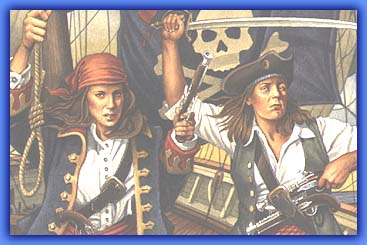
Anne Bonny and Mary Read

ANNE BONNY (1697- UNKNOWN)
Anne Bonny
was born Anne Brennen in 1697
in Kinsale, County Cork, Ireland.
Her mother,
Mary Brennan,
was a servant girl.
Anne was the result
of a scandalous union
with her married employer,
an English-trained lawyer
named William Cormac.
Mrs. Cormac fired Mary
and citing William�s indiscretion
obtained a subsequent divorce.
Mary was briefly jailed.
She was soon released
and with little Anne
she joined William Cormac
and they sailed to America
to begin a new life.
They settled near Charleston
in South Carolina,
where he eventually became
a respected plantation owner.
Anne,
despite her proper upbringing
was destined for a life
of questionable celebrity.
Charleston was one
of the most popular ports
where pirates were welcome.
Anne was fascinated by
what she perceived to be
a life of great adventure.
She was married
in her late teens
to an on-occasion pirate
named James Bonny.
They moved to New Providence
in the Bahamas,
which is now called Nassau.
Married to James Bonny
a poor provider
and unlucky business man,
Anne soon became dissatisfied
with her circumstances
and wandered into the arms
of the notorious rogue,
John 'Calico Jack' Rackham.
Jack persuaded her
to join him
for a life at sea,
and brought her aboard
his pirate ship
disguised as a man.
Women
were not welcome
aboard most sailing ships.
They were thought
to bring bad luck.
Pirates
were well-known for
their superstitious nature
and their numerous insecurities
led to the creation of rules
that forced Calico Jack
to disguise Anne's gender.

MARY READ (1695-1720)
Mary Read
was born in London
to parents of modest means.
Her father was a seaman
from Devon County, England.
Her seafaring father
and an infant brother
died before Mary was born.
Mary was dressed
as a young boy
by her scheming mother
for purely economic reasons.
Mary lived most of her life
as a male youngster
because Mary's mother,
desperate for income,
hired her teenage daughter
out as a footboy
to a rich French woman.
Mary frequented
the docks of Plymouth
and was completely captivated
by the world of seafaring men.
Soon she ran away
and maintaining her disguise,
a signed on for duty aboard
a rugged man-o-war.
Craving a change of scene
a few months later
she jumped ship
and joined the infantry.
She later joined
a horse regiment
and eager to succeed
she adapted easily.
She fought in Flanders
showing great bravery
and early on earned
the distinctive reputation
of being a good soldier.
Serving enthusiastically
in a horse regiment
she began bunking with a man
to whom she was attracted.
She revealed her womanhood.
He proposed marriage,
which she happily accepted.
They pooled their resources
and bought an inn called
The Three Horseshoes.
Most of their customers,
soldiers from their regiment,
soon left service
to return to their homes.
Business plunged into failure,
and Mary�s husband died.
Penniless
and dressed as a man,
she signed on a Dutch ship
bound for the West Indies.
Her merchant ship was attacked
and captured by pirates.
She was the only "English boy"
in the crew,
so Mary was not marooned
with the other seamen.
She was taken aboard
the pirate ship and after
months of plundering
the ship docked
at New Providence,
where Mary Read
would soon cross paths
with yet another
masquerading pirate.
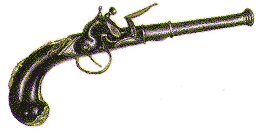
The Caribbean
The Caribbean
was a treacherous place
at the turn of the 18th century.
Pirates,
a gang of thieving,
looting, heavy drinkers
who preferred wild,
aggressive women
were at their pinnacle.
Piracy
was a culture
of swagger and brass
conspicuous weaponry
and portentous flags.
Bringing a woman
aboard a pirate ship
was considered
a hanging offense.
Disguised as a man,
Mary Read signed on
with a Captain Vane,
the sole pirate leader
in New Providence,
who had refused a pardon
from King George of England.
The pardons were offered
from time to time
as an inducement to marauders
to go straight and avoid hanging.
Many of the infamous pirates
simply could not resist
the life of larceny at sea.
Vane was one of them.
He captured the Kingston,
a rich ship from London
laden with liquor,
silver watches
and many pieces of gold.
Vane maneuvered
Calico Jack Rackham
to captain the Kingston.
The fateful maneuver proved
to be a major mistake
in commanding judgment
because when Vane later
demanded loot from the Kingston,
Rackham refused
and instigated a mutiny.
Vane and his followers
were roughly crammed
into a small boat
and cast adrift at sea.
Calico Jack was a relatively
successful pirate
and managed to capture
several choice ships.
Mary fought bravely
and soon became
Calico Jack's lieutenant.
Calico Jack Rackham,
enticed by a royal pardon,
returned to New Providence.
It was there he became involved
with the assertive Anne Bonny,
who had grown weary of her
commonplace husband.
James Bonny was incensed
when he discovered the affair.
Calico Jack suggested that Anne
be granted a divorce by sale.
At that point in history
a wife could be sold
at public auction
to the highest bidder,
so long as both parties agreed.
The infuriated James Bonny
appealed to the governor,
who quickly ordered
Calico Jack and Anne
to put a stop to
their scandalous relationship.
The lovers could not,
and in complete accord,
would not
obey the order.
Calico Jack Rackman
took a disguised Anne,
Mary Read
and several members
of his old crew
out into the harbor
to steal a ship that
they later christened
The Revenge.
They were pirates again.
Once at sea
Mary was attracted to
the new member of the crew,
and the new member to her.
They became closer and closer,
until Mary and Anne realized,
much to their mutual amazement,
that neither of them was
the only woman on board!
Anne convinced Mary
to share her secret
with Calico Jack
since he had brought Anne
aboard in male disguise.
Apparently
Rackham accepted it
but the crew
were not fooled for long
because Anne became pregnant.
Rackham took her to Cuba,
where she stayed until
she delivered the baby.
Anne rejoined the crew later,
and left the child behind in Cuba.
The indomitable threesome
terrorized the Caribbean.
Anne and Mary
fought side by side
in men's clothing,
were expert in the use
of pistol and cutlass
and rightly considered
as fearless and dangerous
as any male pirate.
They were daring in battle
and eager members
of every boarding party.
They gained the respect,
if not the admiration,
of their ship mates.
During one of their raids
they captured a young craftsman,
and forced him into service.
Mary experienced
an immediate attraction
to the young prisoner,
and soon afterward
they became lovers.
She was so taken
with the young man
that when he was challenged
to a duel by another pirate,
Mary stepped boldly in
and killed the challenger.

In 1720
Calico Jack Rackham's ship
was attacked by Captain Barnet,
a former pirate
employed by
Governor Woodes Rogers
to cripple the forces of piracy.
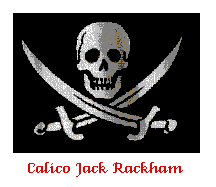
The infamous buccaneer,
Calico Jack Rackman,
as sea legend has it,
is believed to be the one
who created the Jolly Roger,
the grim and dreadful
skull-and-crossbones symbol.
Heavy bombardment
by Barnet�s ship
and drunkenness
sent Calico Jack
and many of his men
below decks to safety.
Anne and Mary
remained on deck
to repel the boarders
from Barnet�s ship.
Anne and Mary
were intensely disappointed
in the cowardice of Jack
and the cowering crew.
They shouted to the men
to come up on deck
and defend the ship.
"If there be a man among ye,
ye'll come out and fight
like the men ye are meant to be,"
Anne shouted fiercely.
Her admonitions
were completely ignored
and the women continued
to fight valiantly against
the outnumbering boarders.
The ship was taken.
When Captain Barnet boarded,
he found two "lads"
scolding Rackham passionately
for his cowardly
lack of action
in the heat of the battle.
Calico Jack Rackman,
Anne Bonny,
Mary Read
and the cowardly crew
were put in irons
and taken to prison.
Calico Jack Rackham
and his entire crew,
including those
who had been captured
and forced into service,
were returned to Jamaica
to face trial for piracy.

Calico Jack Rackman
the other male pirates
went on trial before
Sir Nicholas Laws
on November 16, 1720.
Calico Jack Rackham
claimed to regret his crimes,
but to no avail
for he and the rest of the men
were sentenced to be hanged.
Calico Jack asked
to see Anne one last time.
His request was granted,
but her unkind response
shattered his confidence
and his precious last moments
with the woman he loved.
"If ye had fought like a man,"
she admonished him,
"you would not be hanging now
like a dog!"
Calico Jack Rackham
and his men were hanged
at Gallows Point
at Port Royal.
Calico Jack was buried
at sea�s edge
in an unmarked grave.

The trial of the women
began on November 28, 1720.
Anne and Mary
fully expected to be hanged,
but they did not fear it.
The executions of
Anne and Mary
were postponed.
When asked for their plea,
the women responded,
"M'lord,
we plead our bellies."
Both women were pregnant,
and the law at that time
prohibited the hanging
of a woman carrying a child.
Mary testified at length
concerning her many troubles
and insisted that
she had never really
wanted to be a pirate.
Nevertheless,
she was sentenced to hang
following the birth of her baby.
Mary Read
and her newborn baby
were to die of a fever
while still in prison.

Anne Bonny
was granted a pardon.
Many believe that
her wealthy father
bought her freedom.
Some have suggested
she regretted her conduct
and returned to her husband.
No one is certain
of what happened
to her and her baby.
The history of piracy
is left with one of
its most unlikely pirates
an appropriately outstanding
and baffling conundrum.
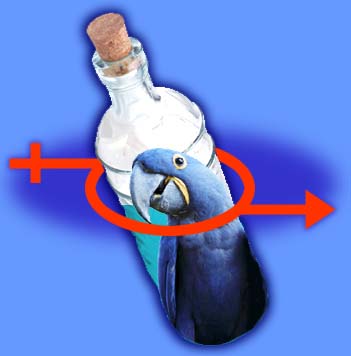
Epilogue:
The nefarious escapades of
Anne Bonny and Mary Read
appeared for the first time
in a book entitled:
The History of Pirates
written by a Captain Johnson.

It was published first
in 1724 and entitled:
The History
of the Robberies and Murders
of the Most Notorious Pyrates
It was this book that established
the pirate characteristics
of bloodthirsty villains
sailing under the Jolly Roger.
Many scholars believe
that Captain Johnson
was Daniel Defoe,
who wrote Robinson Crusoe
only five years earlier.

I especially want to acknowledge
two of my splendid sources
of information and images
that I drew on extensively,
freely quoting and paraphrasing,
to facilitate the creation of this page.

THE PIRATE HOME PAGE
An utterly awesome creation!

RENATO CACHINA�S
PIRATE MEN AND WOMEN
Essays that stimulate the imagination!




to not one
but two
of the greatest chieftains
in the West of Ireland.
and her brazen courage
to establish a formidable
fleet of pirate ships.
was on Clare Island
in Clew Bay.
renounced piracy
in 1586
and received a pardon
from Queen Elizabeth I.


Anne Bonny and Mary Read

ANNE BONNY (1697- UNKNOWN)
Anne Bonny
Her mother,
Anne was the result
Mrs. Cormac fired Mary
Mary was briefly jailed.
She was soon released
They settled near Charleston
Anne,
Charleston was one
Anne was fascinated by
She was married
They moved to New Providence
Married to James Bonny
Jack persuaded her
Women
They were thought
Pirates
was born Anne Brennen in 1697
in Kinsale, County Cork, Ireland.
Mary Brennan,
was a servant girl.
of a scandalous union
with her married employer,
an English-trained lawyer
named William Cormac.
and citing William�s indiscretion
obtained a subsequent divorce.
and with little Anne
she joined William Cormac
and they sailed to America
to begin a new life.
in South Carolina,
where he eventually became
a respected plantation owner.
despite her proper upbringing
was destined for a life
of questionable celebrity.
of the most popular ports
where pirates were welcome.
what she perceived to be
a life of great adventure.
in her late teens
to an on-occasion pirate
named James Bonny.
in the Bahamas,
which is now called Nassau.
a poor provider
and unlucky business man,
Anne soon became dissatisfied
with her circumstances
and wandered into the arms
of the notorious rogue,
John 'Calico Jack' Rackham.
to join him
for a life at sea,
and brought her aboard
his pirate ship
disguised as a man.
were not welcome
aboard most sailing ships.
to bring bad luck.
were well-known for
their superstitious nature
and their numerous insecurities
led to the creation of rules
that forced Calico Jack
to disguise Anne's gender.

MARY READ (1695-1720)
Mary Read
Her father was a seaman
Her seafaring father
Mary was dressed
Mary lived most of her life
Mary frequented
Soon she ran away
Craving a change of scene
She later joined
She fought in Flanders
Serving enthusiastically
She revealed her womanhood.
He proposed marriage,
They pooled their resources
Most of their customers,
Business plunged into failure,
Penniless
Her merchant ship was attacked
She was the only "English boy"
She was taken aboard
was born in London
to parents of modest means.
from Devon County, England.
and an infant brother
died before Mary was born.
as a young boy
by her scheming mother
for purely economic reasons.
as a male youngster
because Mary's mother,
desperate for income,
hired her teenage daughter
out as a footboy
to a rich French woman.
the docks of Plymouth
and was completely captivated
by the world of seafaring men.
and maintaining her disguise,
a signed on for duty aboard
a rugged man-o-war.
a few months later
she jumped ship
and joined the infantry.
a horse regiment
and eager to succeed
she adapted easily.
showing great bravery
and early on earned
the distinctive reputation
of being a good soldier.
in a horse regiment
she began bunking with a man
to whom she was attracted.
which she happily accepted.
and bought an inn called
The Three Horseshoes.
soldiers from their regiment,
soon left service
to return to their homes.
and Mary�s husband died.
and dressed as a man,
she signed on a Dutch ship
bound for the West Indies.
and captured by pirates.
in the crew,
so Mary was not marooned
with the other seamen.
the pirate ship and after
months of plundering
the ship docked
at New Providence,
where Mary Read
would soon cross paths
with yet another
masquerading pirate.

Pirates,
Piracy
Bringing a woman
Disguised as a man,
The pardons were offered
Many of the infamous pirates
Vane was one of them.
He captured the Kingston,
Vane maneuvered
The fateful maneuver proved
Vane and his followers
Calico Jack was a relatively
Mary fought bravely
Calico Jack Rackham,
It was there he became involved
James Bonny was incensed
Calico Jack suggested that Anne
At that point in history
The infuriated James Bonny
The lovers could not,
Calico Jack Rackman
They were pirates again.
Once at sea
They became closer and closer,
Anne convinced Mary
Apparently
Rackham took her to Cuba,
Anne rejoined the crew later,
The indomitable threesome
Anne and Mary
They were daring in battle
They gained the respect,
During one of their raids
Mary experienced
She was so taken
The Caribbean
The Caribbean
was a treacherous place
at the turn of the 18th century.
a gang of thieving,
looting, heavy drinkers
who preferred wild,
aggressive women
were at their pinnacle.
was a culture
of swagger and brass
conspicuous weaponry
and portentous flags.
aboard a pirate ship
was considered
a hanging offense.
Mary Read signed on
with a Captain Vane,
the sole pirate leader
in New Providence,
who had refused a pardon
from King George of England.
from time to time
as an inducement to marauders
to go straight and avoid hanging.
simply could not resist
the life of larceny at sea.
a rich ship from London
laden with liquor,
silver watches
and many pieces of gold.
Calico Jack Rackham
to captain the Kingston.
to be a major mistake
in commanding judgment
because when Vane later
demanded loot from the Kingston,
Rackham refused
and instigated a mutiny.
were roughly crammed
into a small boat
and cast adrift at sea.
successful pirate
and managed to capture
several choice ships.
and soon became
Calico Jack's lieutenant.
enticed by a royal pardon,
returned to New Providence.
with the assertive Anne Bonny,
who had grown weary of her
commonplace husband.
when he discovered the affair.
be granted a divorce by sale.
a wife could be sold
at public auction
to the highest bidder,
so long as both parties agreed.
appealed to the governor,
who quickly ordered
Calico Jack and Anne
to put a stop to
their scandalous relationship.
and in complete accord,
would not
obey the order.
took a disguised Anne,
Mary Read
and several members
of his old crew
out into the harbor
to steal a ship that
they later christened
The Revenge.
Mary was attracted to
the new member of the crew,
and the new member to her.
until Mary and Anne realized,
much to their mutual amazement,
that neither of them was
the only woman on board!
to share her secret
with Calico Jack
since he had brought Anne
aboard in male disguise.
Rackham accepted it
but the crew
were not fooled for long
because Anne became pregnant.
where she stayed until
she delivered the baby.
and left the child behind in Cuba.
terrorized the Caribbean.
fought side by side
in men's clothing,
were expert in the use
of pistol and cutlass
and rightly considered
as fearless and dangerous
as any male pirate.
and eager members
of every boarding party.
if not the admiration,
of their ship mates.
they captured a young craftsman,
and forced him into service.
an immediate attraction
to the young prisoner,
and soon afterward
they became lovers.
with the young man
that when he was challenged
to a duel by another pirate,
Mary stepped boldly in
and killed the challenger.

In 1720
Calico Jack Rackham's ship
was attacked by Captain Barnet,
a former pirate
employed by
Governor Woodes Rogers
to cripple the forces of piracy.

The infamous buccaneer,
Calico Jack Rackman,
as sea legend has it,
is believed to be the one
who created the Jolly Roger,
the grim and dreadful
skull-and-crossbones symbol.
Heavy bombardment
by Barnet�s ship
and drunkenness
sent Calico Jack
and many of his men
below decks to safety.
Anne and Mary
remained on deck
to repel the boarders
from Barnet�s ship.
Anne and Mary
were intensely disappointed
in the cowardice of Jack
and the cowering crew.
They shouted to the men
to come up on deck
and defend the ship.
"If there be a man among ye,
ye'll come out and fight
like the men ye are meant to be,"
Anne shouted fiercely.
Her admonitions
were completely ignored
and the women continued
to fight valiantly against
the outnumbering boarders.
The ship was taken.
When Captain Barnet boarded,
he found two "lads"
scolding Rackham passionately
for his cowardly
lack of action
in the heat of the battle.
Calico Jack Rackman,
Anne Bonny,
Mary Read
and the cowardly crew
were put in irons
and taken to prison.
Calico Jack Rackham
and his entire crew,
including those
who had been captured
and forced into service,
were returned to Jamaica
to face trial for piracy.

Calico Jack Rackman
the other male pirates
went on trial before
Sir Nicholas Laws
on November 16, 1720.
Calico Jack Rackham
claimed to regret his crimes,
but to no avail
for he and the rest of the men
were sentenced to be hanged.
Calico Jack asked
to see Anne one last time.
His request was granted,
but her unkind response
shattered his confidence
and his precious last moments
with the woman he loved.
"If ye had fought like a man,"
she admonished him,
"you would not be hanging now
like a dog!"
Calico Jack Rackham
and his men were hanged
at Gallows Point
at Port Royal.
Calico Jack was buried
at sea�s edge
in an unmarked grave.

The trial of the women
began on November 28, 1720.
Anne and Mary
fully expected to be hanged,
but they did not fear it.
The executions of
Anne and Mary
were postponed.
When asked for their plea,
the women responded,
"M'lord,
we plead our bellies."
Both women were pregnant,
and the law at that time
prohibited the hanging
of a woman carrying a child.
Mary testified at length
concerning her many troubles
and insisted that
she had never really
wanted to be a pirate.
Nevertheless,
she was sentenced to hang
following the birth of her baby.
Mary Read
and her newborn baby
were to die of a fever
while still in prison.

Anne Bonny
was granted a pardon.
Many believe that
her wealthy father
bought her freedom.
Some have suggested
she regretted her conduct
and returned to her husband.
No one is certain
of what happened
to her and her baby.
The history of piracy
is left with one of
its most unlikely pirates
an appropriately outstanding
and baffling conundrum.

Epilogue:
The nefarious escapades of
Anne Bonny and Mary Read
appeared for the first time
in a book entitled: The History of Pirates
written by a Captain Johnson.

It was published first
in 1724 and entitled:
The History
of the Robberies and Murders
of the Most Notorious Pyrates
It was this book that established
Many scholars believe
the pirate characteristics
of bloodthirsty villains
sailing under the Jolly Roger.
that Captain Johnson
was Daniel Defoe,
who wrote Robinson Crusoe
only five years earlier.

I especially want to acknowledge
two of my splendid sources
of information and images
that I drew on extensively,
freely quoting and paraphrasing,
to facilitate the creation of this page.

THE PIRATE HOME PAGE
An utterly awesome creation!

RENATO CACHINA�S
PIRATE MEN AND WOMEN
Essays that stimulate the imagination!



